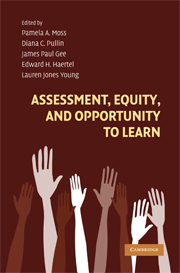Book contents
- Frontmatter
- Contents
- Preface
- List of Contributors
- ASSESSMENT, EQUITY, AND OPPORTUNITY TO LEARN
- 1 Introduction
- 2 Assessment Through the Lens of “Opportunity to Learn”
- 3 A Sociological Perspective on Opportunity to Learn and Assessment
- 4 A Sociocultural Perspective on Opportunity to Learn
- 5 Individualizing Assessment and Opportunity to Learn
- 6 Cultural Modeling as Opportunity to Learn
- 7 Opportunities to Learn in Practice and Identity
- 8 Game-Like Learning
- 9 Sociocultural Implications for Assessment I
- 10 Issues of Structure and Issues of Scale in Assessment from a Situative/Sociocultural Perspective
- 11 Sociocultural Implications for Assessment II
- 12 Assessment, Equity, and Opportunity to Learn
- Index
- References
10 - Issues of Structure and Issues of Scale in Assessment from a Situative/Sociocultural Perspective
Published online by Cambridge University Press: 05 June 2012
- Frontmatter
- Contents
- Preface
- List of Contributors
- ASSESSMENT, EQUITY, AND OPPORTUNITY TO LEARN
- 1 Introduction
- 2 Assessment Through the Lens of “Opportunity to Learn”
- 3 A Sociological Perspective on Opportunity to Learn and Assessment
- 4 A Sociocultural Perspective on Opportunity to Learn
- 5 Individualizing Assessment and Opportunity to Learn
- 6 Cultural Modeling as Opportunity to Learn
- 7 Opportunities to Learn in Practice and Identity
- 8 Game-Like Learning
- 9 Sociocultural Implications for Assessment I
- 10 Issues of Structure and Issues of Scale in Assessment from a Situative/Sociocultural Perspective
- 11 Sociocultural Implications for Assessment II
- 12 Assessment, Equity, and Opportunity to Learn
- Index
- References
Summary
INTRODUCTION
A situative/sociocultural (S/SC) perspective “views knowledge as distributed among people and their environments, including the objects, artifacts, tools, books, and communities of which they are a part. Analyses of activity in this perspective focus on processes of interaction of individuals with other people and with physical and technological systems” (Greeno, Collins, and Resnick 1997). Accordingly, “a situated view of assessment emphasizes questions about the quality of student participation in activities of inquiry and sense making, and considers assessment practices as integral components of the general systems of activity in which they occur” (p. 37). Research on school learning from the SC perspective “incorporates explanatory concepts that have proved useful in fields such as ethnography and sociocultural psychology to study collaborative work, …mutual understanding in conversation, and other characteristics of interaction that are relevant to the functional success of the participants' activities” (p. 7). In such analyses, attention focuses on patterns of interactions that occur in detailed and particular situations, yields “thick” descriptions of the activities, and often produces voluminous data. Studies at this level of detail are essential for understanding the conditions and interactions through which students learn; that is, “opportunities to learn” that particular circumstances afford particular students in light of their particular personal and educational histories of experience.
Yet no practical assessment at the level of the classroom, let alone a school or a program, can demand scores of hours of video per student, all analyzed by a team of graduate students, each producing a multipage ideographic report.
- Type
- Chapter
- Information
- Assessment, Equity, and Opportunity to Learn , pp. 259 - 294Publisher: Cambridge University PressPrint publication year: 2008
References
- 7
- Cited by

